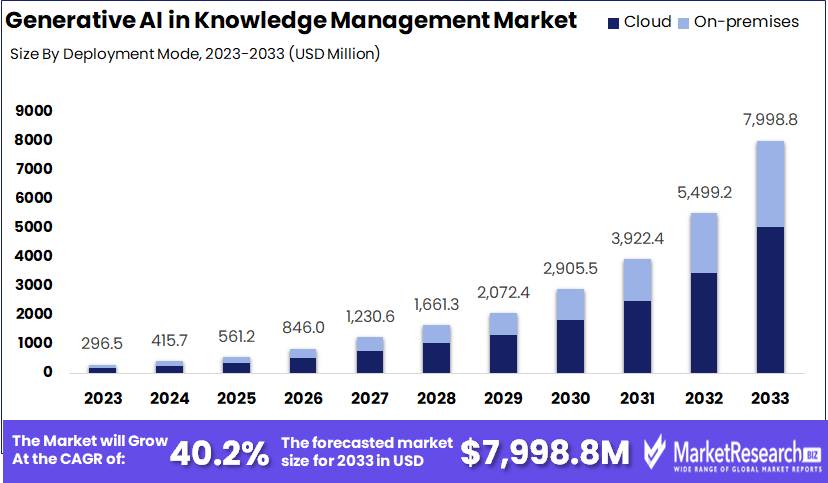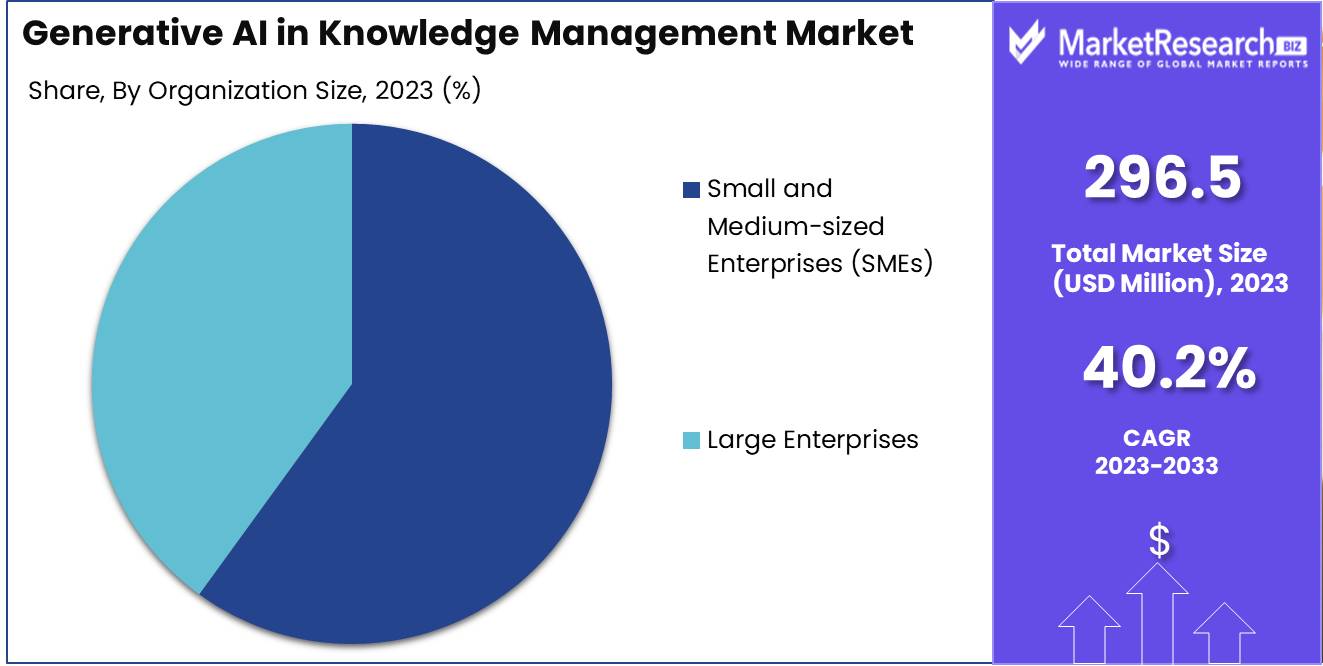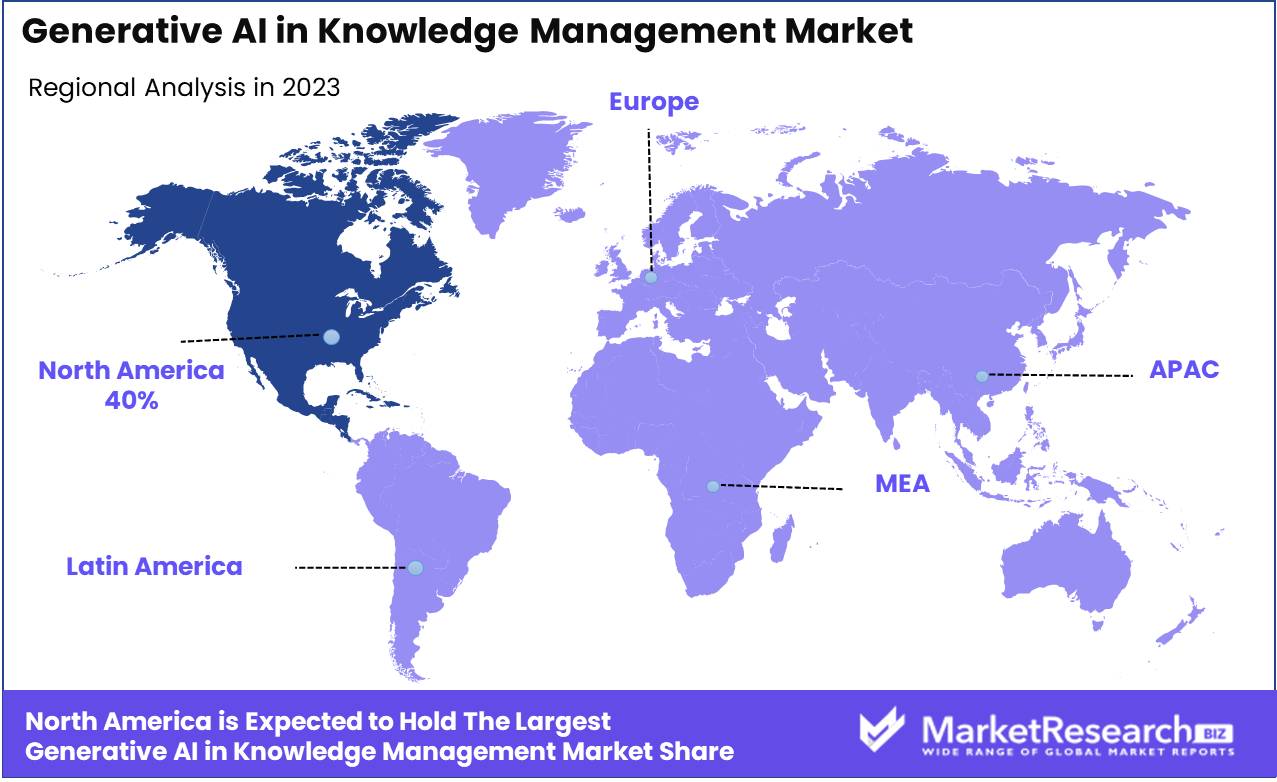
Generative AI in Knowledge Management Market By Deployment Mode(Cloud, On-premises), By Organization Size(Small and Medium-sized Enterprises (SMEs), Large Enterprises), By Application(Content Generation, Document Summarization, Question Answering Systems, Knowledge Discovery, Other Applications), By Industry Vertical(Healthcare, BFSI, Retail and E-commerce, IT and Telecommunications, Manufacturing, Government and Public Sector, Media and Entertainment, Other Industry Verticals), By Region And Companies - Industry Segment Outlook, Market Assessment,
-
44135
-
March 2024
-
179
-
-
This report was compiled by Vishwa Gaul Vishwa is an experienced market research and consulting professional with over 8 years of expertise in the ICT industry, contributing to over 700 reports across telecommunications, software, hardware, and digital solutions. Correspondence Team Lead- ICT Linkedin | Detailed Market research Methodology Our methodology involves a mix of primary research, including interviews with leading mental health experts, and secondary research from reputable medical journals and databases. View Detailed Methodology Page
-
Quick Navigation
Report Overview
The Generative AI in the knowledge management market was valued at USD 296.5 Million in 2023. It is expected to reach USD 7,998.8 Million by 2033, with a CAGR of 40.2% during the forecast period from 2024 to 2033.
The surge in demand for advanced technologies and the rise in organizational management practices are some of the main key driving factors for generative AI in knowledge management.

Generative AI in knowledge management is defined as the integration of artificial intelligence methods to simplify the creation, organization, and propagation of knowledge in an organization or community. Such advanced technology uses machine learning algorithms to analyze the huge quantities of information that comprise documents, engagements, and conversations to produce precious insights and information. It supports deriving relevant organizational knowledge from unorganized data sources like text, videos, and images and differentiating them for easy retrieval.
It also facilitates the development of new knowledge by producing practices, and explanations and even synthesizing new innovative ideas related to the existing data. It also improves integration by suggesting relevant resources, linking individuals with the same interests and skills, and facilitating organizational knowledge workers by sharing across teams and departments. Moreover, this technology changes knowledge management techniques by making them more effective, easily accessible, and adaptive to the growing requirements of organizations in the digital advanced age.
According to IBM in July 2023, highlights that 67% of the executives were concerned about the potential liabilities of AI. Moreover, with the power of AI, enterprises can use knowledge management tools to gather, develop, access, and share appropriate information for organizational insights. Knowledge management software applications are often executed into a centralized systems and knowledge base to aid business domains and tasks that comprise talent, application modernization, and customer services. According to the study conducted by IBV, AI can include contact center cases by improving customer experience by 70%. Moreover, AI can boost productivity in HR by 40% and in application modernization by 30%.
Implementing, generative AI in knowledge management, automates the content design, summarization,, and categorizations, preserving time and effort. It improves search potentialities, deriving insights from huge data sets for more informed decision-making. Generative AI in knowledge management will nurture collaboration by linking individuals with suitable skills and facilitating knowledge by sharing across organizational boundaries.Knowledge management applications of Generative AI will become more popular as more verticals of industries seek its use, leading to market expansion in coming years.
Key Takeaways
- Market Growth: Generative AI in Knowledge Management Market was valued at USD USD 296.5 Million in 2023. It is expected to reach USD 7,998.8 Million by 2033, with a CAGR of 40.2% during the forecast period from 2024 to 2033.
- By Deployment Mode: Cloud deployment facilitates seamless scalability and accessibility for SMEs in healthcare, enhancing content generation efficiency.
- By Organization Size: SMEs in healthcare rely on cloud solutions for agile content generation, fostering innovation and competitiveness.
- By Application: Cloud deployment empowers SMEs in healthcare to streamline content generation processes, driving operational efficiency.
- By Industry Vertical: Healthcare SMEs leverage cloud technology for content generation, optimizing resources, and enhancing service delivery.
- Regional Dominance: In North America, Generative AI in Knowledge Management Market dominates with a XX% share.
- Growth Opportunity: Generative AI offers substantial opportunities in knowledge management, enabling automated content creation and curation, as well as advanced natural language understanding and generation, driving efficiency and accessibility in the market.
Driving factors
Enhancing Efficiency through Large Language Models
The improvement in the performance of Large Language Models (LLMs) has significantly propelled Generative AI in Knowledge Management Market. These advancements have not only increased the accuracy and efficiency of information retrieval and synthesis but also expanded the potential applications of generative AI across various industries. Improved LLMs help create more contextually relevant and informative content, and enable a deeper integration of AI into knowledge management solutions.
The optimization of these models facilitates the processing of vast datasets, enabling the extraction of actionable insights more swiftly and accurately. This evolution has been instrumental in driving the adoption of generative AI technologies, as organizations seek to leverage these improvements to gain a competitive edge in information management and decision-making processes.
The Creative and Content Generation Revolution
The rise in the era of content creation and creative applications signifies a transformative period for Generative AI in Knowledge Management Market. This trend is characterized by an increasing demand for innovative tools that can produce original, high-quality content across various formats. Generative AI technologies are at the forefront of this revolution, offering capabilities that significantly reduce the time and resources required for content creation.
This has opened up new avenues for creativity and personalization, particularly in sectors like media & entertainment, where there is a constant need for fresh and engaging content. The integration of generative AI into creative processes is reshaping how content is conceived, produced, and distributed, marking a pivotal shift in the landscape of digital content creation.
Personalization at Scale in Key Industries
The high demand for personalization and creativity in sectors such as media & entertainment, BFSI (Banking, Financial Services, and Insurance), and retail & eCommerce is a critical driver for the Generative AI in Knowledge Management Market. In these industries, personalization is not just a value-add but a fundamental expectation among consumers. Generative AI enables the customization of content, recommendations, and services at an unprecedented scale, enhancing customer engagement and satisfaction.
In retail and eCommerce, for example, AI-driven personalization can lead to higher conversion rates and customer loyalty by delivering tailored shopping experiences. Similarly, in the BFSI sector, personalized financial advice and customer service, powered by generative AI, can significantly improve customer relations and operational efficiency. This demand for high-level personalization, powered by advancements in AI, underscores the growing significance of generative AI in meeting contemporary market needs and expectations.
Restraining Factors
The Impact of Data Privacy and Security on Market Expansion
Data privacy and security concerns represent significant hurdles for the growth of the Generative AI in Knowledge Management Market. As these systems necessitate access to extensive datasets, including sensitive and proprietary information, the potential for data breaches or misuse becomes a critical issue. Organizations are increasingly wary of adopting generative AI solutions without robust security measures in place, fearing the reputational and financial repercussions of data mishandling.
This apprehension directly affects market expansion, as potential clients might delay or forego investments in generative AI technologies. Furthermore, stringent data protection regulations in various regions impose additional compliance burdens on providers, potentially slowing down innovation and deployment. Despite these challenges, the emphasis on enhancing data security and privacy protocols can also serve as a catalyst for market differentiation, where software companies that successfully address these concerns gain a competitive edge.
Navigating Ethical and Bias Challenges in Generative AI
Ethical and bias considerations in generative AI algorithms pose complex challenges for the Knowledge Management Market. The risk of perpetuating biases present in the training data is a considerable concern, as it can lead to biased outputs or unethical content generation. This not only affects the reliability and fairness of AI-generated content but also raises significant ethical questions regarding the use of such technologies. Industries that rely heavily on unbiased and accurate information, such as healthcare, legal, and government sectors, may be particularly hesitant to adopt generative AI solutions without guarantees of impartiality.
Addressing these concerns requires continuous efforts in algorithmic fairness, transparency, and accountability, which can impose additional costs and delays in product development. However, tackling these ethical challenges head-on is essential for building trust and credibility in generative AI applications, ultimately fostering more inclusive and responsible market growth.
By Deployment Mode Analysis
Cloud deployment fosters scalability and flexibility in SMEs' content generation endeavors.
In 2023, Cloud held a dominant market position in the By Deployment Mode segment of the Generative AI in Knowledge Management Market. The burgeoning adoption of cloud-based solutions across various industries contributed significantly to its prominence. Cloud deployment offers unparalleled flexibility, scalability, and accessibility, aligning seamlessly with the evolving needs of businesses seeking advanced knowledge management solutions.
Cloud-based deployment models enable organizations to leverage the power of Generative AI without the constraints of physical infrastructure. This accessibility fosters easier integration with existing systems and workflows, driving operational efficiency and agility. Moreover, the scalability of cloud platforms empowers businesses to adapt to fluctuating demands, ensuring optimal resource utilization and cost-effectiveness.
On the other hand, the On-premises deployment option, while still relevant for certain enterprises with specific security or compliance requirements, witnessed comparatively slower growth in 2023. This trend can be attributed to the inherent limitations associated with on-premises infrastructure, including higher initial investments, maintenance complexities, and limited scalability.
The dominance of Cloud deployment in the By Deployment Mode segment underscores the increasing preference for flexible and scalable solutions in knowledge management. Organizations across various sectors are prioritizing agility and accessibility, driving the momentum towards cloud-based Generative AI solutions.
By Organization Size Analysis
SMEs in healthcare utilize the cloud for efficient content generation solutions.
In 2023, Small and Medium-sized Enterprises (SMEs) held a dominant market position in the By Organization Size segment of the Generative AI in Knowledge Management Market. This segment, characterized by the deployment of advanced artificial intelligence technologies within organizational frameworks, witnessed significant traction, particularly among SMEs seeking to optimize their knowledge management processes. SMEs, buoyed by their agility and increasing adoption of cutting-edge technologies, emerged as key drivers in this market segment.
Large Enterprises, while maintaining a notable presence, encountered intensified competition from SMEs due to their ability to swiftly adapt and implement generative AI solutions tailored to their specific organizational requirements. The competitive landscape saw SMEs leveraging generative AI to enhance knowledge discovery, extraction, and dissemination, thereby streamlining operational workflows and fostering innovation within their respective domains.
The growth of SMEs in this segment can be attributed to several factors, including their growing recognition of the strategic importance of efficient knowledge management, coupled with the accessibility of AI-driven solutions tailored to their scale and budgetary constraints. Additionally, the proliferation of cloud-based platforms and scalable AI technologies facilitated SMEs' seamless integration of generative AI into their existing knowledge management frameworks.
Looking ahead, SMEs are poised to sustain their dominance in the By Organization Size segment of the Generative AI in Knowledge Management Market, fueled by their inclination towards agile and innovative approaches to business operations. As SMEs continue to prioritize knowledge management as a cornerstone of their competitive strategy, the market is expected to witness further proliferation of AI-driven solutions tailored to meet the evolving needs of these dynamic enterprises.

By Application Analysis
Content generation thrives in healthcare SMEs with cloud-based deployment strategies.
In 2023, Content Generation held a dominant market position in the By Application segment of the Generative AI in Knowledge Management Market. This segment, characterized by the proliferation of artificial intelligence technologies aimed at generating high-quality content, experienced robust growth driven primarily by the escalating demand for automated content creation solutions across various industries.
Content Generation emerged as the frontrunner in this segment, owing to its wide-ranging applications across diverse sectors such as marketing, e-commerce, publishing, and education. Organizations increasingly turned to generative AI solutions to streamline content creation processes, improve content quality, and enhance audience engagement.
Document Summarization followed closely, reflecting the growing need for efficient knowledge extraction and synthesis tools to manage the ever-expanding volume of digital information. Question Answering Systems also garnered significant traction, catering to the demand for conversational AI interfaces capable of providing accurate and contextually relevant responses to user queries.
Furthermore, Knowledge Discovery solutions played a pivotal role in empowering enterprises to unlock actionable insights from vast repositories of data, driving informed decision-making and fostering innovation. Other Applications, including sentiment analysis, language translation, and content personalization, contributed to the diversified landscape of generative AI in knowledge management, catering to niche requirements across various industries.
Looking ahead, Content Generation is poised to maintain its dominance in the By Application segment, supported by ongoing advancements in natural language processing and deep learning technologies. As organizations continue to prioritize content quality and relevance in their knowledge management strategies, the market is expected to witness sustained innovation and adoption of generative AI solutions across diverse application domains.
By Industry Vertical Analysis
Cloud empowers SMEs in healthcare to streamline content generation processes effectively.
In 2023, Healthcare held a dominant market position in the By Industry Vertical segment of the Generative AI in Knowledge Management Market. This segment, characterized by the integration of artificial intelligence technologies to enhance knowledge management practices, witnessed substantial growth driven by the healthcare industry's increasing focus on leveraging data-driven insights to improve patient outcomes and operational efficiency.
Healthcare emerged as the leading vertical in this segment, fueled by the rising adoption of generative AI solutions to address key challenges such as medical research, clinical decision support, and patient care management. With the exponential growth of medical data and the complexity of healthcare systems, organizations within the sector turned to advanced AI-driven knowledge management tools to extract valuable insights from vast datasets, facilitate knowledge sharing among healthcare professionals, and drive evidence-based medical practices.
Among other industry verticals, BFSI (Banking, Financial Services, and Insurance) also demonstrated notable uptake of generative AI in knowledge management, particularly in areas such as risk management, fraud detection, and personalized customer services. Retail and E-commerce followed closely, leveraging AI-powered knowledge management solutions to enhance customer experience, optimize supply chain operations, and drive sales through targeted content generation and recommendation systems.
In addition, IT and Telecommunications, Manufacturing, Government and Public Sector, Media and Entertainment, and other industry verticals showcased a growing interest in adopting generative AI technologies to streamline knowledge management processes, improve decision-making, and gain a competitive edge in their respective domains.
Key Market Segments
By Deployment Mode
- Cloud
- On-premises
By Organization Size
- Small and Medium-sized Enterprises (SMEs)
- Large Enterprises
By Application
- Content Generation
- Document Summarization
- Question Answering Systems
- Knowledge Discovery
- Other Applications
By Industry Vertical
- Healthcare
- BFSI
- Retail and E-commerce
- IT and Telecommunications
- Manufacturing
- Government and Public Sector
- Media and Entertainment
- Other Industry Verticals
Growth Opportunity
Content Creation and Curation
The integration of Generative AI into content creation and curation represents a significant advancement in the knowledge management industry. This technology automates the production and management of content, thereby enhancing efficiency and reducing the time and resources required for these tasks. The growth in this segment can be attributed to the increasing demand for dynamic content generation across various sectors, including education, healthcare, and corporate environments.
Generative AI's capability to produce tailored content based on specific user inputs or data trends presents a substantial opportunity for market expansion. Furthermore, the technology's ability to curate and update knowledge bases in real-time ensures that organizations have access to the most current and relevant information, optimizing decision-making processes.
Natural Language Understanding and Generation
Advancements in Natural Language Processing (NLP) have significantly improved the proficiency of generative AI systems in understanding and generating human-like text. This development opens up vast opportunities for enhancing interactive learning platforms, customer service interfaces, and automated report generation. The capacity of generative AI to comprehend complex language nuances and generate coherent, contextually relevant responses can significantly augment the efficiency and quality of knowledge management systems.
The market potential in this area is further bolstered by the increasing need for sophisticated chatbots and virtual assistants capable of providing accurate information and support in various languages, making knowledge management systems more accessible and user-friendly across global markets.
Latest Trends
Automation of Knowledge Creation and Curation
Generative AI is reshaping the landscape of knowledge creation and curation through its ability to automate tasks and streamline content generation workflows. By leveraging advanced algorithms, Generative AI systems can analyze vast amounts of data, extract relevant insights, and produce high-quality content autonomously.
This trend is driving efficiency gains for organizations across various industries, enabling them to rapidly generate and update knowledge repositories with minimal human intervention. As businesses seek to optimize their knowledge management processes, the demand for Generative AI solutions capable of automating content creation and curation is expected to soar.
Ethical and Responsible AI Practices
With the widespread adoption of generative AI in knowledge management, there is a growing emphasis on ethical and responsible AI practices. Concerns surrounding data privacy, bias mitigation, and transparency have prompted organizations to prioritize ethical considerations in their AI initiatives. In the context of knowledge management, ensuring the integrity and fairness of generated content is paramount to maintaining trust and credibility.
As a result, industry stakeholders are actively implementing strategies to address ethical challenges associated with Generative AI, such as developing robust governance frameworks, conducting ethical audits, and fostering collaboration between human experts and AI systems. By embracing ethical and responsible AI practices, organizations can harness the full potential of Generative AI while mitigating risks and safeguarding against unintended consequences.
Regional Analysis
Generative AI adoption in North America's knowledge management market is projected to grow by 40%
In North America, characterized by its robust technological infrastructure and penchant for innovation, the market for generative AI in knowledge management is flourishing. The region commands a dominant position, representing approximately 40% of the global market share. Factors such as the proliferation of advanced data analytics tools, widespread digitization initiatives, and a strong presence of key industry players contribute to the region's leadership in this segment. Additionally, the escalating demand for efficient knowledge management solutions across various sectors, including IT, healthcare, and finance, further propels market expansion in North America.

Moving to Europe, the region exhibits a burgeoning interest in generative AI for knowledge management applications. With a growing emphasis on digital transformation initiatives and the increasing adoption of AI-driven technologies across enterprises, Europe emerges as a significant player in the global market landscape. Although currently trailing North America in market share, Europe's commitment to technological advancement and its large base of knowledge-intensive industries position it as a key contender for market growth.
Meanwhile, in the Asia Pacific, a region renowned for its rapid technological adoption and burgeoning digital economy, the market for generative AI in knowledge management is on a steady ascent. Countries such as China, Japan, and India are witnessing substantial investments in AI research and development, fostering a conducive environment for market expansion. With increasing digitization efforts across sectors like manufacturing, healthcare, and BFSI (Banking, Financial Services, and Insurance), the Asia Pacific region holds immense potential for the proliferation of generative AI technologies in knowledge management.
In the Middle East & Africa and Latin America regions, while the market for generative AI in knowledge management is still nascent compared to other regions, there exists a growing awareness and adoption of these technologies. Factors such as improving infrastructure, rising investments in digital transformation initiatives, and the recognition of AI's transformative potential contribute to the gradual uptake of generative AI solutions in these regions.
Key Regions and Countries
North America
- The US
- Canada
- Rest of North America
Europe
- Germany
- France
- The UK
- Spain
- Netherlands
- Russia
- Italy
- Rest of Europe
Asia-Pacific
- China
- Japan
- Singapore
- Thailand
- South Korea
- Vietnam
- India
- New Zealand
- Rest of Asia Pacific
Latin America
- Mexico
- Brazil
- Rest of Latin America
Middle East & Africa
- Saudi Arabia
- South Africa
- UAE
- Rest of the Middle East & Africa
Key Players Analysis
In 2023, the global Generative AI in Knowledge Management market witnessed a dynamic landscape with key players vying for dominance and innovation. Among the prominent entities shaping this sector, OpenAI, Google, Microsoft, IBM, Salesforce, and Amazon (AWS) emerged as frontrunners, each bringing their unique expertise and technological prowess to the forefront.
OpenAI, renowned for its cutting-edge AI research and development, continues to set benchmarks with its advanced generative models, catering to diverse knowledge management needs. Google and Microsoft, giants in the tech industry, leverage their extensive resources and R&D capabilities to pioneer innovative solutions, integrating generative AI seamlessly into their suite of services.
IBM's longstanding commitment to artificial intelligence and cognitive computing positions it as a formidable player in the market, offering robust knowledge management solutions tailored to enterprise requirements. Salesforce, a leader in customer relationship management, incorporates generative AI to enhance knowledge sharing and customer support, thereby amplifying operational efficiency.
Amazon's AWS division, with its cloud computing infrastructure and AI capabilities, empowers organizations with scalable and adaptable knowledge management solutions. Semantic Scholar, Consensus, Nuance Communications, Zoho Corporation, Concentrix Corporation, Gemshelf Inc., and eGain Corporation further enrich the market ecosystem with their specialized offerings, catering to diverse industry verticals and business requirements.
Market Key Players
- OpenAI
- Microsoft
- IBM
- Salesforce
- Amazon (AWS)
- Semantic Scholar
- Consensus
- Nuance Communications
- Zoho Corporation
- Concentrix Corporation
- Gemshelf Inc.
- eGain Corporation
- Other Key Players
Recent Development
- In March 2024, Guru introduces AI-driven Answers AI, enhancing knowledge retrieval and productivity. Integration with popular tools like Google Chrome and Slack streamlines workflow, fostering efficient collaboration.
- In March 2024, Guru's AI search tools, including Answers AI, maximize workplace productivity by providing instant access to knowledge. Their innovative AI-driven solutions streamline workflows, enhancing efficiency and fostering continuous learning.
- In March 2024, Elitery launched Elipedia, an AI-based knowledge management system, powered by Google Cloud's gen AI capabilities. It streamlines knowledge management processes, offering seamless performance, scalability, and security for businesses.
Report Scope
Report Features Description Market Value (2023) USD 296.5 Million Forecast Revenue (2033) USD 7,998.8 Million CAGR (2024-2032) 40.2% Base Year for Estimation 2023 Historic Period 2016-2023 Forecast Period 2024-2033 Report Coverage Revenue Forecast, Market Dynamics, COVID-19 Impact, Competitive Landscape, Recent Developments Segments Covered By Deployment Mode(Cloud, On-premises), By Organization Size(Small and Medium-sized Enterprises (SMEs), Large Enterprises), By Application(Content Generation, Document Summarization, Question Answering Systems, Knowledge Discovery, Other Applications), By Industry Vertical(Healthcare, BFSI, Retail and E-commerce, IT and Telecommunications, Manufacturing, Government and Public Sector, Media and Entertainment, Other Industry Verticals) Regional Analysis North America - The US, Canada, Rest of North America, Europe - Germany, France, The UK, Spain, Italy, Russia, Netherlands, Rest of Europe, Asia-Pacific - China, Japan, South Korea, India, New Zealand, Singapore, Thailand, Vietnam, Rest of Asia Pacific, Latin America - Brazil, Mexico, Rest of Latin America, Middle East & Africa - South Africa, Saudi Arabia, UAE, Rest of Middle East & Africa Competitive Landscape OpenAI, Google, Microsoft, IBM, Salesforce, Amazon (AWS), Semantic Scholar, Consensus, Nuance Communications, Zoho Corporation, Concentrix Corporation, Gemshelf Inc., eGain Corporation, Other Key Players Customization Scope Customization for segments, region/country-level will be provided. Moreover, additional customization can be done based on the requirements. Purchase Options We have three licenses to opt for Single User License, Multi-User License (Up to 5 Users), Corporate Use License (Unlimited User and Printable PDF) -
-
- OpenAI
- Microsoft
- IBM
- Salesforce
- Amazon (AWS)
- Semantic Scholar
- Consensus
- Nuance Communications
- Zoho Corporation
- Concentrix Corporation
- Gemshelf Inc.
- eGain Corporation
- Other Key Players




